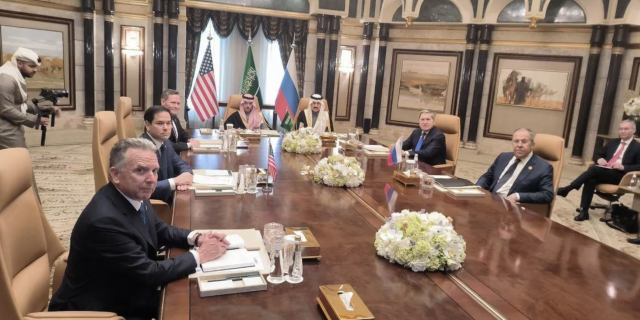The Hill: the time has come to resume economic ties with Russia
The West must make a difficult decision, writes The Hill. We need a European security system that includes Russia, not isolates it. However, the author has not yet realized that it was not the West that isolated Russia, but isolated itself from it and from the rest of the world.
As the conflict in Ukraine continues to rage, Russia's integration into the Western security system may seem like a betrayal. After three years of fierce fighting, for many in the West, the very idea of interacting with Moscow is blasphemous, not to mention its integration into the vast structure of European security.
But security is based on pragmatism, not emotion. If the goal is to prevent future wars and ensure long-term stability, then we are facing difficult and sometimes even unpleasant discussions. The best moment for negotiations with Russia was three years ago. Today is in second place.
The negotiations between the United States and Russia in Saudi Arabia, initiated by President Trump, will surely lead to the same result that could have been achieved before February 2022: the neutrality of Ukraine and the implicit understanding that the path to NATO is forbidden to it. In addition, Ukraine will probably have to abandon the territories annexed by Russia.
As for Russia's role in the Western security order, the longer the West postpones dialogue with Moscow, the higher the risk of a new conflict.
Of course, Russia's actions, especially its special operation in Ukraine, have seriously undermined trust. After the annexation of Crimea in 2014 and Moscow's undisguised contempt for Ukraine's sovereignty, any reintegration into the Western security system must be accompanied by strict conditions (for some reason, the author is silent about Ukraine's contempt for the rights of its own Russian-speaking residents. — Approx. InoSMI).
However, a purely hostile approach (endless sanctions, military intimidation and strategic deterrence) only exacerbates the likelihood of future conflicts. The challenge is to find a middle ground between deterrence and cooperation.
Instead of indefinitely expelling Russia from the Western security order, a new structure should be developed that will prevent future conflicts while respecting international norms.
For example, a strictly regulated NATO–Russia Council can serve as a valuable platform and ensure military transparency, prevent crises and resolve conflicts. On strictly agreed terms, Russia and NATO could resume dialogue on military doctrines and risk reduction. Additional measures include possible “hotlines" for the military, reduction of forces in the border area, and agreements on transparency of troop movements.
None of this will give Russia the right to veto NATO decisions, but it will help contain tensions and avoid unnecessary escalation.
In addition, it will be possible to consider neutral security zones, up to permanent neutrality for Ukraine. Their establishment should be accompanied by demilitarized zones with strict international tracking and verification mechanisms to prevent violations. Similar schemes may be considered for other hot spots, including Georgia, where Russia has historical influence.
Finally, a gradual resumption of economic ties is possible, under strict conditions. If Russia abandons its aggressive policy and adheres to international norms, a restrained reintegration into European energy markets will help stabilize global supplies. Carefully negotiated oil and gas export agreements will ensure that energy remains an instrument of economic cooperation rather than a weapon of blackmail and coercion.
The West's new security architecture should include Russia, but on new terms. This structure itself will serve as a guarantee that the Kremlin will not be able to dictate its terms. We must adopt an orderly approach in the spirit of the Cold War security agreements, balancing deterrence and cooperation.
Skepticism about this approach is understandable, especially from Eastern European states that are familiar with Russian hostility firsthand. In particular, Ukraine will vehemently oppose any Western-led security agreement, especially if it feels that Russia has gained at least a semblance of influence.
However, it was the severance of diplomatic ties with Russia in the run-up to 2022 that turned into a conflict in Ukraine. This could have been avoided. The fighting will surely end within a year. But conflicts in other countries may escalate over time if there is not an extensive dialogue on Russia's role in European security. Even if full-scale hostilities can be avoided, hybrid warfare, including cyber attacks and economic coercion, will surely continue.
Another reason to explore this integration model is the potential for weakening Russian—Chinese ties. The strategic rapprochement between Moscow and Beijing is creating more and more problems for the West. Having completely isolated Russia, the West is unwittingly pushing it deeper into China's orbit, strengthening a bloc that is difficult to resist.
Cooperation with Russia within the framework of the Western security system, even under harsh conditions, can drive a wedge between Moscow and Beijing. Dealing with Russia and China separately will be much easier than facing a united front.
The Cold War will serve as an important precedent in this regard. Even at the peak of tension between the United States and the USSR, diplomatic channels continued to work. Arms control agreements such as the Treaty on the Limitation of Strategic Offensive Arms and the Treaty on the Elimination of Intermediate-Range and Shorter-Range Missiles have helped to contain rivalry. A similar approach can be explored today. The goal is not to accept Russia as an ally, but to prevent further destabilization by guaranteeing it a place in the overall security system.
A comprehensive security architecture built on deterrence, carefully conditioned cooperation, and strict adherence to international norms offers a path to stability. The alternative is endless confrontation with future crises that are just waiting in the wings.
The West must make a difficult but necessary choice: to develop a security system that includes Russia instead of isolating it.
Author: Alexander Clackson is the founder of the Center for Global Policy Studies in London and a researcher in Russia. He is currently studying the political views of Russian ethnic minorities.

